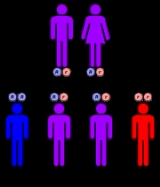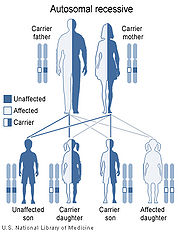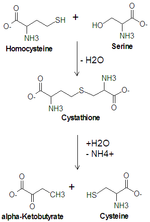
Cystathioninuria
Encyclopedia
Cystathioninuria, also called cystathionase deficiency, is an autosomal recessive
metabolic disorder that results in an excess of cystathionine
in the urine
. It is associated with a congenital dysfunction of the enzyme cystathionase, or acquired deficiency of vitamin B6
which is essential for the function of this enzyme. The latter is usually related to an overall deficiency of all the B-complex vitamins.
 Cystathioninuria is inherited in an autosomal recessive manner. This means the defective gene responsible for the disorder is located on an autosome
Cystathioninuria is inherited in an autosomal recessive manner. This means the defective gene responsible for the disorder is located on an autosome
, and two copies of the defective gene (one inherited from each parent) are required in order to be born with the disorder. The parents of an individual with an autosomal recessive disorder both carry
one copy of the defective gene, but usually do not experience any signs or symptoms of the disorder.

Recessive
In genetics, the term "recessive gene" refers to an allele that causes a phenotype that is only seen in a homozygous genotype and never in a heterozygous genotype. Every person has two copies of every gene on autosomal chromosomes, one from mother and one from father...
metabolic disorder that results in an excess of cystathionine
Cystathionine
Cystathionine is an intermediate in the synthesis of cysteine.It is generated from homocysteine and serine by cystathionine beta synthase.It is cleaved into cysteine and α-ketobutyrate by cystathionine gamma-lyase....
in the urine
Urine
Urine is a typically sterile liquid by-product of the body that is secreted by the kidneys through a process called urination and excreted through the urethra. Cellular metabolism generates numerous by-products, many rich in nitrogen, that require elimination from the bloodstream...
. It is associated with a congenital dysfunction of the enzyme cystathionase, or acquired deficiency of vitamin B6
Vitamin B6
Vitamin B6 is a water-soluble vitamin and is part of the vitamin B complex group. Several forms of the vitamin are known, but pyridoxal phosphate is the active form and is a cofactor in many reactions of amino acid metabolism, including transamination, deamination, and decarboxylation...
which is essential for the function of this enzyme. The latter is usually related to an overall deficiency of all the B-complex vitamins.
Genetics

Autosome
An autosome is a chromosome that is not a sex chromosome, or allosome; that is to say, there is an equal number of copies of the chromosome in males and females. For example, in humans, there are 22 pairs of autosomes. In addition to autosomes, there are sex chromosomes, to be specific: X and Y...
, and two copies of the defective gene (one inherited from each parent) are required in order to be born with the disorder. The parents of an individual with an autosomal recessive disorder both carry
Genetic carrier
A genetic carrier , is a person or other organism that has inherited a genetic trait or mutation, but who does not display that trait or show symptoms of the disease. They are, however, able to pass the gene onto their offspring, who may then express the gene...
one copy of the defective gene, but usually do not experience any signs or symptoms of the disorder.
Pathophysiology


